
Are you taking the leap into the wild and wonderful world of teaching elementary science? Congratulations! 🎉
From making science notebooks your best friend to transforming your classroom into a curiosity-filled lab (minus the lab rats), we’ve got tips and tricks that even Albert Einstein would high five us for!
Ready to become the next superhero in the epic saga of science education? Get your lab goggles 🥽 on, and let’s get started with these 10 tips for new elementary science teachers!
SaveSave
1. Love Science 💙
Kids arrive with innate curiosity. With hands-on lesson plans, you can ✨ spark their love for science and make your classes the highlight of their day.
2. Get to Know Your Students 👩🎓
Discover the secrets hidden within your students’ scientific interests and knowledge by utilizing our Science Interest Inventory, a valuable resource that will help you tailor your teaching approach to their unique curiosities and passions.
Find it in the Science Penguin Free Resource Library. If you’re not signed up, you’ll definitely want to after reading this post!
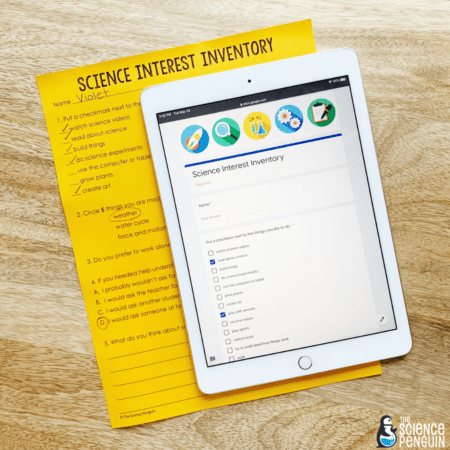
3. Interactive Science Notebooks 📓
Consider incorporating science notebooks in your classroom. Get ready to witness the power of these little paper portals as they unleash your students’ scientific thinking!
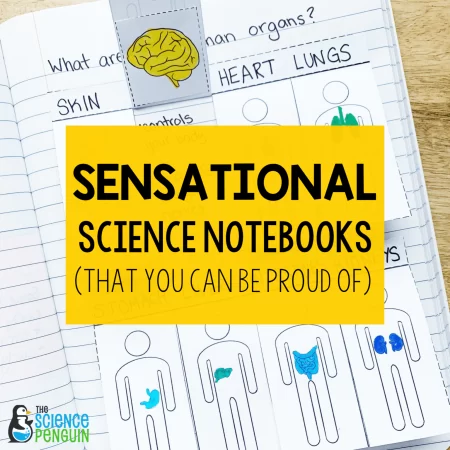
4. Know Your Resources 🔬
Time to do some detective work! Understand what curriculum resources, technology, lab materials are available to you. Regardless of what you have on hand, we offer adaptable lessons that make use of basic materials.
5. Familiarize Yourself with Your Standards 🗺
Take a moment to analyze your state’s science standards and plan your roadmap for the year ahead. Fourteen states dance to the NGSS groove, while others have their own science standards, like the Texas TEKS. Make sure you know what standards you use and what topics you are expected to teach.
6. Prepare to Teach Vocabulary 💬
Remember, science vocabulary is more than just a list of fancy words – it’s the secret handshake to the cool club of science understanding! Mastering it will not only help your students decode the science jargon, but it will also equip them with the linguistic tools they need to confidently navigate the scientific world. Get ready for action.
7. Invest Time in Setting up Your Classroom 🪴
Whether you’re transforming your classroom into a buzzing science lab or managing a multi-subject wonderland, a well-thought-out plan for decor and organization is key.
It’s all about creating a space that nurtures learning and curiosity, no matter what subjects you teach.
8. Plan for the First 2 Weeks ✏️
Harness the power of our comprehensive resources to lay out a meticulous plan for your first two weeks. These pivotal weeks set the stage for the rest of the academic year, and our carefully curated resources are there to ensure your opening act is a showstopper!
We’ll even send you our day-by-day planning guide if you like.
9. Promote Cooperative Learning 🗣
For a smooth sailing ship in your science class, structured group work is your anchor. So chart a course for lab teams that’ll work together as seamlessly as peas in a DNA pod – efficiency and effectiveness are the North Stars of successful teamwork.
10. Reflect on Your Teaching Style 🙋♀️
Take some time to answer these questions about how you want your class to function.
- How will you assess your students?
- Does your district have required testing?
- Do you want to use project-based learning?
- How can you integrate literacy skills?
- Will you give homework?
- Do you know if students will complete a warm-up?
- Would you like to use the 5E Model?
- Do you want to have science stations?
- How will you provide accommodations to students with special needs?
- How will you enrich your high achievers?
- What will you do with any extra time?
Sign up for the Free Resource Library
This is an exclusive library of 40+ science printables, labs, activities, and games for grades 3-6. Sign up and check your email for immediate access.

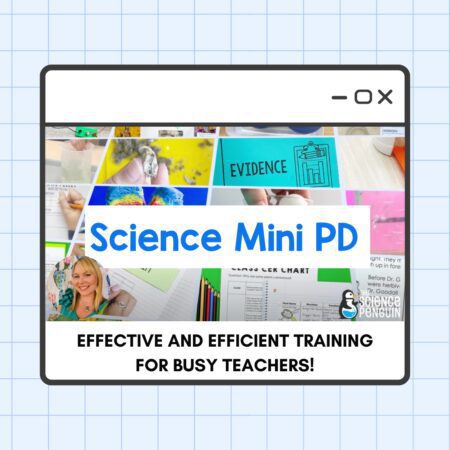
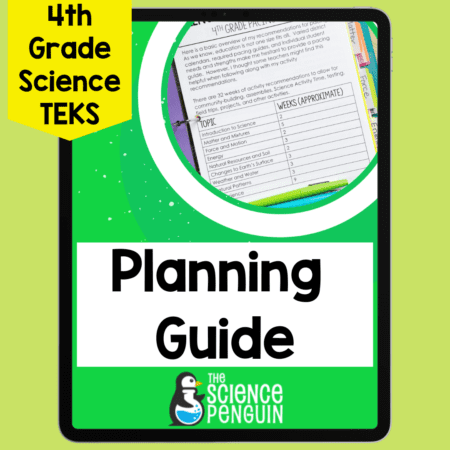
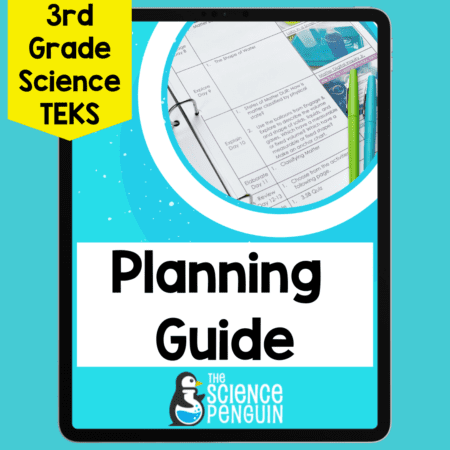

12 thoughts on “Advice for New Science Teachers {10 Tips}”
Hi there! I am a second year teacher teaching Science for the first time. I am really interested in using interactive notebooks. Any advice on how to start them?
Hi Shannon.
Check out my posts on Interactive Science Notebooks. That will hopefully help.
http://www.thesciencepenguin.com/2013/06/first-week-setting-up-science-notebooks.html
Hi Ariane.
I am currently going to school for elementary education. I have noticed in some of my placements in different elementary classrooms that there is not a whole lot of time set aside for science because of the focus on reading and math. What is your advice for me as a new teacher as far as conducting hands on activities and experiments in science when you only have 20 minutes a day? I have found that it can be difficult to get the task completed in that amount of time with 25 students in the classroom.
I encourage you to devote more time to science and social studies than 20 min. per day. When other teachers ask me how can I “take time away from and math”? I reply, how are students going to understand what they read or why a math skill is important if they have no or limited background knowledge to build upon?
If possible focus your science lessons/ activities/ demonstrations on science skills that can be tied into reading or math curriculum. Charting the results of a project can go with math. Write about the conclusions students draw about an activity can support Lang. Arts.
Inspired
I am an elementary education major and this is so helpful! I like the steps to get ready for the school year. I also like the lab roles that are suggested- this makes doing lab work more straightforward for students that don’t have to focus on the little details. The questions provided are also great because it helps to think of all the different things you can incorporate into the classroom!
Great post! I have used FOSS Science kits for a few years, and I really like them. We have found that putting visuals up on a board, word walls, science journal sentence starters, and the like are very helpful for younger students.
I appreciate your comment about science journals. We have experimented with students leaving verbal reflections about science work on iPads, and it has gone pretty well.
Assigning science roles is mentioned in FOSS, and I agree that it can be a time saver. Especially when you have multiple kids wandering around a science room (potentially carrying glass items, liquids, or fragile containers) knowing who is going where can be very important. Thanks!
I will be teaching Science for the first time this year and your blog has got me so excited to teach Science! You have no idea how helpful this is! Thank you for all of your hard wrk putting this together!
Work
This is awesome! I am studying to become an elementary teacher and I am so excited and nervous. After reading these 10 tips it helped calm down my nerves so much! Thank you this was really helpful!
Hi! I love your science ideas and materials and have been using them for the past 3 years. Every year I add something new! I noticed that the link you provided for 5E is broken. Do you have any other sites for this? Thank you!
Oh no, try this one: https://nasaeclips.arc.nasa.gov/teachertoolbox/the5e
Ari